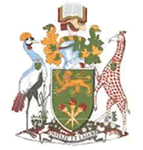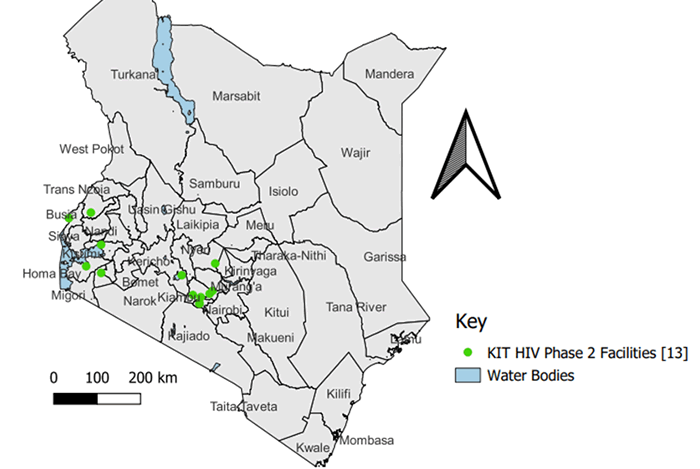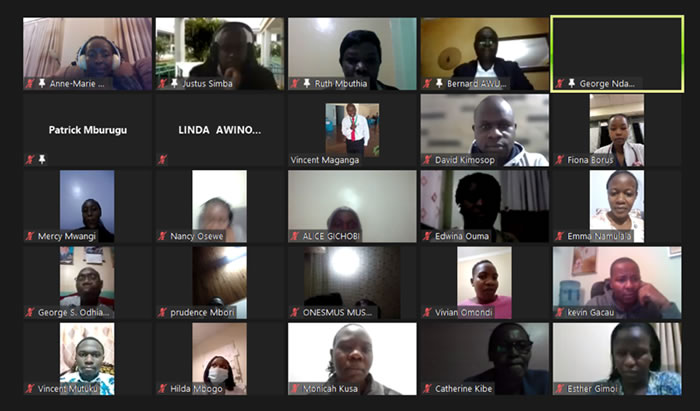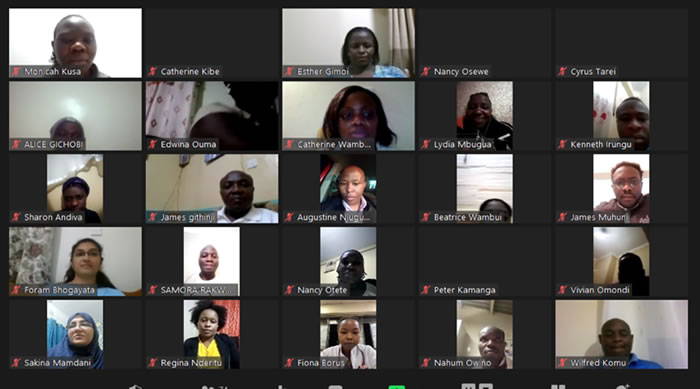 KEY PERSONNEL: Dr. Onesmus Gachuno (PI), Patrick Mburugu (Co-PI), George Wambiri (Finance Administrator), Dr Patrick Mburugu (eLearning Coordinator), Ms Ruth Emboyoga Mbuthia (Training Coordinator)
KEY PERSONNEL: Dr. Onesmus Gachuno (PI), Patrick Mburugu (Co-PI), George Wambiri (Finance Administrator), Dr Patrick Mburugu (eLearning Coordinator), Ms Ruth Emboyoga Mbuthia (Training Coordinator)
PROJECT TITLE: Kenya Inter-Professional Training for HIV (KIT- HIV) Cycle II
PROJECT YEAR 1 RECAP:
The KIT-HIV team trained 16 facilitators to lead 3 workshops with 394 learners trained to deliver high-quality team-based HIV care. Of the 394 learners, 300 were pre-service and 94 were postgraduate. They developed an interprofessional approach to learning to encourage teamwork.
PROJECT YEAR 2 SUMMARY:
The KIT-HIV team trained 18 facilitators to lead four training cohorts, each spanning three weeks, teaching two to three modules per week. A total of 437 learners were trained on the four core modules and four additional ones selected (4, 7, 9, and 12). Two of the cohorts focused on pre-service learners, while the other two focused on in-service learners. In addition to the AFREhealth webinars, additional facilitator trainings were conducted to ensure the team was ready to support learners.
MAIN ACCOMPLISHMENTS:
- Using virtual technology allowed a greater number of learners to benefit from the training; 437 learners were trained, as opposed to the projected target of 163.
- Due to the active support of the training team, a high number of learners were successful in utilizing the LMS (434 of 437)
- The connection made between facilitators and learners was much appreciated; learners requested continued contact to consult facilitators when faced with challenging clinical cases in the future.
- Successfully recruited learners from a considerable number of facilities (13) from 9 counties
- Some learners have taken the knowledge and skills in leadership gained from the STRIPE course to step into mentorship roles
- 3 individuals earned certificates from participating in the Professor James Hakim Leadership Development Program
- 1 individual was a speaker for a session titled “Mentorship” in the Professor James Hakim Leadership Development Program
CHALLENGES AND SOLUTIONS
- Scheduling trainings so that both pre-service and in-service learners could attend was difficult. Late afternoon-early evening weekdays enabled both pre-service and in-service students to accomplish their daily activities before joining the trainings, leading to high enrollments and completion rates.
- Due to how the LMS was established, the team did not have direct access to pre- and post-test results. Additional coordination with the AFREHealth LMS technical support group was required and future improvements to the system recommended.
TRAINING PARTNERS
- University of Nairobi
- Kenyatta University
- Jomo Kenyatta University of Agriculture and Technology
- Maseno University
PARTICIPATING CINICAL SITES
The following 13 clinical sites contributed post-graduate learners. All are PEPFAR-supported. Figure 1 indicates the location of the sites.
|
Name of Institution |
County |
|
Kenyatta National Hospital |
Nairobi |
|
Mbagathi Level V Hospital |
Nairobi |
|
Kiambu Level V Hospital |
Kiambu |
|
Tigoni Level IV Hospital |
Kiambu |
|
Jomo Kenyatta University Hospital |
Kiambu |
|
Thika Level V Hospital |
Kiambu |
|
Karatina Level V Hospital |
Nyeri |
|
Naivasha County Referral Hospital |
Nakuru |
|
Homa Bay County Referral |
HomaBay |
|
Jaramogi Oginga Odinga Referral Hospital (JOOTRH) |
Kisumu |
|
Busia County Referral Hospital |
Busia |
|
Bungoma County Referral Hospital |
Bungoma |
|
Kisii County Referral Hospital |
Kisii |
Figure 1. Map showing the distribution of KIT- HIV year 2 post-graduate trainees across Botswana

IMPLEMENTATION
- Training cohorts: 4
- Facilitators Trained: 18
|
Professional Cadre |
Years of Experience |
Gender |
Teaching Experience |
||||
|
Medical |
14 |
0-5 years |
2 |
Male |
12 |
HIV educator |
18 |
|
Nursing/Midwifery |
3 |
6-10 years |
3 |
Female |
6 |
Non-HIV educator |
0 |
|
Pharmacy |
1 |
> 11 years |
13 |
Other |
0 |
0 |
|
|
Laboratory |
0 |
0 |
0 |
0 |
|||
|
Other |
0 |
0 |
0 |
0 |
|||
- Learners trained: 437
|
Medical |
Nursing/Midwifery |
Pharmacy |
Laboratory |
Other |
Total |
|
|
Preservice |
128 |
41 |
28 |
0 |
0 |
197 |
|
Postgraduate < 12 months |
0 |
0 |
0 |
0 |
0 |
0 |
|
Postgraduate > 12 months |
133 |
35 |
35 |
6 |
31 |
240 |
|
Total |
261 |
76 |
63 |
6 |
31 |
437 |
|
Gender |
|
|
Male |
266 |
|
Female |
171 |
|
Total |
437 |
INNOVATING HIV TRAINING DURING COVID-19
- Continuity of training was possible despite constraints due to COVID-19, with the availability of training resources through the AFREhealth LMS.
- Successful movement through the LMS was dependent on both the learners’ internet connection and the number of active users on the site; learners received roughly $30 USD in internet bundles to support successfully accessing the training site.
BROADER IMPACT
The project received letters of support from all participating universities and their affiliate training institutions. At project inception, the Deans were briefed on the project benefits, targets and outcomes, and follow up email communication was sent to ensure adequate buy-in from the different stakeholders. Each of the participating universities nominated a focal person to champion the process and ensure participants trained will mentor others within their areas of practice, ultimately leading to improved clinical management of patients.
Project outcomes will be disseminated at conferences and through publications. Specifically, program activities will be identified to stakeholders during HIV technical working groups at both the national level, at NSACOP TWG meetings, and at the county level, through county health management team meetings.
Methods from the STRIPE HIV trainings have been adapted into the teaching styles and courses at partner institutions. Positive learner feedback has prompted the adoption of virtual training and case-based approaches in other courses when feasible. Due to their training through STRIPE, facilitators are facilitating other HIV-related trainings at partner universities. The interprofessional approach has been used to increase mentorship by faculty members. Finally, one HEPI program has adopted the KIT HIV training to support it’s learners.
IMPACT VIGNETTES
- “To see the kind of appreciation of different roles played by care givers and the engagement of all the disciplines discussing patient care is amazing.” – Facilitator
- “I am extremely grateful for the opportunity to be able to take part in the training program…” – Learner
- “We got a perfect platform to have an interprofessional class with discussions that will help build confidence in all care givers as we perform our duties in the facilities.” –Learner
- “The evening online training allowed us flexible time to be in class for our normal sessions but still be capacity-built on matters HIV in the evening.” – Learner
- “We can now have time to gain more knowledge with the online sessions after our working hours in the comfort of our homes and this is great....” – Health Professional, learner
- “The fact that there is diversity of location in the sense that we have participants from Nyanza, western, central, Rift Valley and Nairobi brings a wealth of experience in the discussions.” – Health Professional, learner
- “Transitioning STRIPE to online learning has had a positive impact on the number of students from our various institutions. Initially, only a handful of participants could be accommodated in a face-to-face breakout but with online learning, the number has been doubled and the sessions impactful.” – Training Team
- “It is becoming increasingly possible and easy for us to meet online to deliberate and plan for the sessions from whichever corner of the country we are in, making teaching and learning efficient.” – Training Team
PROGRAM PICTURES:
Participants and facilitators in one of the trainings:









